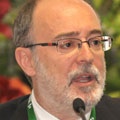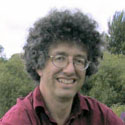Academic Editors
The following people constitute the Editorial Board of Academic Editors for PeerJ. These active academics are the Editors who seek peer reviewers, evaluate their responses, and make editorial decisions on each submission to the journal. Learn more about becoming an Editor.

Chris Brown
Chris Brown is a clinical trial bio-statistician at the NHMRC Clinical Trails Centre at the University of Sydney. His main area of expertise is in oncology trials but also has experience in cardiology and neonatal research. His main areas of research are in pharmacoepidemiology and statistical methods.

Pierpaolo Pani
Dr. Pierpaolo Pani is a Associate Professor within the Department of Physiology and Pharmacology, SAPIENZA, University of Rome. He received a MSc in Experimental Psychology and PhD in Neurophysiolgy (Behavioral and Integrative) at Sapienza University (Rome), and was a post-doc in KULeuven (Laboratory for Neuro- and Psychophysiology).
Dr. Pani's main topics of investigation include Cognitive control, executive functions, goal-oriented behavior and decision making. These topics include behavioral and psychophysiological investigations in humans; behavioral and neuronal dynamics investigations in mammals; characterization of executive functions control in psychiatric conditions.

Ipsita Mohanty
Dr. Ipsita Mohanty is a Research Associate II at the Children's Hospital of Philadelphia Research Institute
Her current research focuses on investigating the molecular mechanisms of nitric oxide signaling pathway at the proteome levels using multipronged approach of mouse genetics, ex vivo mechanistic functional study as well as high throughput mass spectroscopy techniques.
Dr. Mohanty has expertise in pharmacology, physiology, and proteomics with emphasis in intracellular signal transduction and GPCR signaling directed towards designing therapeutic strategies for cardiovascular disorders. Technical cognizance encompasses fields of Smooth Muscle pharmacology, Integrative Physiology, Contraction Physiology, Proteomics, Biochemistry, Molecular Biology, Bioinformatic Data Analysis (and related softwares) for Mass Spectrometry data and In-Vivo skills.

Bo Huang
Dr. Bo Huang is a Professor with the Department of Geography and Resource Management, The Chinese University of Hong Kong, where he is also the Associate Director of Institute of Space and Earth Information Science and the Director of MSc Program in GeoInformation Science. Prior to this, he held faculty positions at University of Calgary (Geomatics Engineering), Canada and National University of Singapore (Civil Engineering). His research interests are broad, covering most aspects of Geographical Information Science (GIScience), specifically: satellite image fusion for environmental monitoring, spatial/spatio-temporal statistics for land cover/land use change modeling, spatial optimization for sustainable urban and land use planning, Intelligent Transportation Systems (ITS), and web/wireless GIS for location-based services. Dr. Huang has published extensively in the field of GIScience, including over 130 refereed international journal articles, and serves as Executive Editor of Annals of GIS (Taylor & Francis) and Asia-Pacific Regional Editor of International Journal of Geographical Information Science (Taylor & Francis). He also serves as the Editor-in-Chief of Comprehensive GIS, a three volume landmark GIS book to be published by Elsevier (Oxford). Currently he is exploring along the line of spatiotemporal data analytics, convinced that this new paradigm will revolutionize the way how geospatial data are integrated, analyzed and utilized in the future.

Łukasz Jaremko
Dr. Łukasz Jaremko is Associate Professor at King Abdullah University of Science and Technology.
Research in Dr. Jaremko's Molecular Diagnostics and Drug Discovery (MD3) group focuses on atomic-level insight into essential and topical questions from biochemistry and medicine.

Stefano S.K. Kaburu
Dr Kaburu is currently a Senior Lecturer in Conservation Biology at Nottingham Trent University, in the UK. Dr Kaburu completed his PhD in Anthropology in 2014 at the School of Anthropology and Conservation of the University of Kent in the UK, during which he studied grooming behaviour and cooperation in wild chimpanzees.
In 2014-2015, he was a post-doc in Dr Stephen Suomi’s Laboratory of Comparative Ethology, at the National Institutes of Health in the US where he examined the development of social cognition in infant rhesus macaques. Between 2016 and 2018 he was a post-doctoral fellow in Dr Brenda McCowan’s Laboratory at the School of Veterinary Medicine of the University of California in Davis, during which he studied the drivers and outcome of human-macaque interactions in Northern India.
His main areas of research interests are animal (especially primates) social behaviour and conservation, human-wildlife interactions and infant development

Josep A. Tur
Professor of Physiology, University of the Balearic Islands (UIB). Director, Research Group in Community Nutrition and Oxidative Stress (UIB). Director of nutritional surveys in Spain & Argentina. Head, Department of Fundamental Biology & Health Sciences (UIB). Founding member of the Spanish Academy of Nutrition and Food Science, the Spanish Society of Community Nutrition, and the World's Public Health Nutrition Association. Member, the UN Standing Committee on Nutrition.

Amy NS Siuda
I am a marine ecologist and biological oceanographer. My research interests span marine plankton ecology from organismal to population and community levels. Plankton form the foundations of marine food webs. Complex interactions exist among plankton as well as between plankton and the physical/chemical environment. To understand these patterns and processes, my research team employs experimental (e.g., controlled bottle experiments), observational (e.g., net tow sampling) and molecular approaches in data collection. Current projects include: distribution and diversity of Sargassum and its associated community; and plankton-microplastic interactions. I am also passionate about decreasing accumulation of plastic marine debris. Through the Reduce Single-Use Project, we raise awareness of the plastic marine debris problem and encourage reduction of single-use plastic consumption on campus, in St. Petersburg, and across Florida.

Ann E. Loraine
I am a Professor of Bioinformatics and Genomics at UNC Charlotte.

Adina Howe
Adina Howe is an Assistant Professor in the Department of Agricultural and Biosystems Engineering Department at Iowa State University. Her research group, GERMS (Genomics and Environmental Research in Microbial Systems), focuses on integrating traditional microbiology approaches with metagenomics and computational biology as investigative tools to understand environmental microbial populations.

Alan Hastings
Distinguished Professor of Environmental Science and Policy. Fellow of the American Academy of Arts and Sciences. Former President of the Society for Mathematical Biology and Editor of the Encyclopedia of Theoretical Ecology.

Jingyi Jessica Li
I am an Assistant Professor in the Department of Statistics and Department of Human Genetics at University of California, Los Angeles. I am also a faculty member in the Interdepartmental Ph.D. Program in Bioinformatics and a member in the Jonsson Comprehensive Cancer Center (JCCC) Gene Regulation Research Program Area. Prior to joining UCLA, I obtained my Ph.D. degree from the Interdepartmental Group in Biostatistics at University of California, Berkeley, where I worked with Profs Peter J. Bickel and Haiyan Huang. I received my B.S. (summa cum laude) from Department of Biological Sciences and Technology at Tsinghua University, China in 2007.

